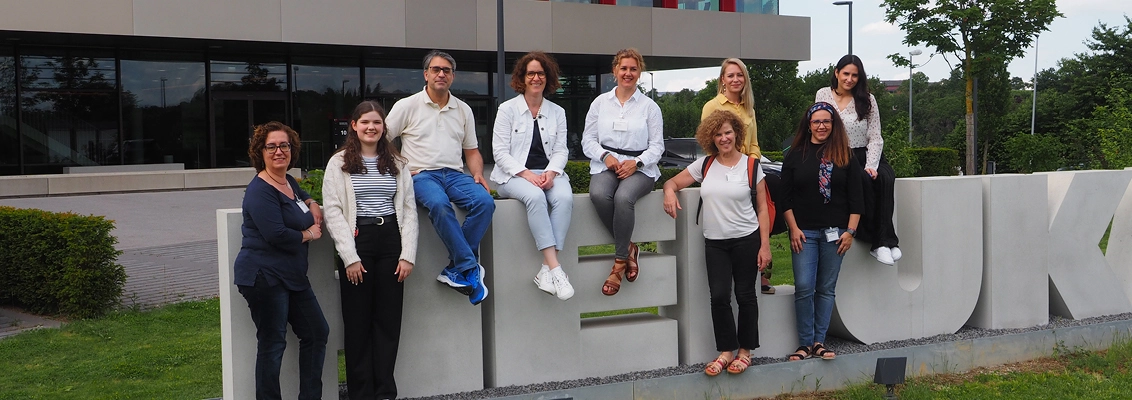Preparing Students for the Working World with Erasmus+
As part of our commitment to vocational students and in support of Erasmus+, we welcomed 9 Spanish teachers into the HELUKABEL headquarters in Germany.

Contents
Recently, our colleagues at HELUKABEL HQ opened their doors once again. We’re a welcoming bunch and are proud to be able to host so many experts, educators, students, partners, and more. We even offer delicious snacks and tours around our fantastic warehouses.
This time, HQ welcomed a group of Spanish educators to learn about Germany’s specialised dual education system. Rumours have it, similar vocational training opportunities will be rolled out across Spain!
What is Germany’s Dual Education System?
Since the Vocational Training Act of 1969 passed, Germany has led a globally admired dual education system. It involves students splitting their time between on-the-job training and in-school education. With over 300 recognised professions and a wealth of businesses involved, students have a range of choices at their fingertips. Nearly half of all German students go on to dual education rather than attending university due to the recognised benefits.
- Certifications are widely recognised by employers
- Students can earn while they learn
- Chances on the labour market are greatly improved
- Students are exposed to the latest skills and innovations
Vocational Education Vs Apprenticeships Vs Traditional Education
Germany’s vocational educational system is often confused with the UK’s apprenticeship scheme. While they have similarities, Germany’s vocational education system is recognised as better. This is due to the range of options available to students and the blend of on-the-job experience and in-class study.
Traditional education, on the other hand, involves students attending school until 16 before progressing to college and university. That said, universities in the UK and Germany are experiencing a steady surge in enrolments.
Who Introduced Vocational Education?
It’s hard to pinpoint exactly when vocational education was introduced and by whom. Every country has its own history and evolution of dual learning.
For example, University College London (UCL) says the first UK inquiry into this type of learning was in 1875. They then say polytechnics started popping up in the 1880s as a response. However, it wasn’t until 2012 that regulations on employment and guided learning hours were introduced.
Germany’s system, however, was introduced following the Vocational Training Act of 1969.
What is the Erasmus+ Programme?
The Erasmus+ programme is the EU’s solution to support educational mobility. Its name is adopted after Dutch philosopher Desiderius Erasmus of Rotterdam. However, it also loosely stands for the European Community Action Scheme for the Mobility of University Students.
The programme aims to help students spend a year studying abroad while improving organisational cooperation. It is designed to increase learning quality, support inclusion, and boost creativity. Opportunities are available for higher, vocational, school, adult, and sport education. So far, in its 37 years, more than 3 million students have been able to participate.
Can Erasmus+ Students Come to the UK?
Until 31 January 2020, the UK was an EU member state and took part in the Erasmus+ programme. Now, the UK is a non-associated third country of the programme. This means UK students have limited opportunities to participate in international education. Likewise, international students will find it more challenging to come to the UK with Erasmus+.
Is HELUKABEL part of the Erasmus+ Programme?
As HELUKABEL HQ is in Germany, it actively participates in vocational education. This is because we are all committed to supporting students where we can.
That said, it’s not the organisations, themselves, that are “part” of the Erasmus programme. It’s schools.
For HELUKABEL HQ, The Eric-Bracher School is just two towns over. This school is actively involved in the Erasmus+ programme. And, it's the reason so many brilliant student trainees work with HELUKABEL.
Both students and teachers at The Eric-Bracher School take part in regular exchange opportunities. For example, in the Spanish city of Valencia where our visitors came from. The school aims to support foreign language abilities and open doors to the professional world.
Why Were Spanish Educators at HELUKABEL?
HELUKABEL isn’t just a leading global manufacturer and distributor of cables and accessories. We’re a family-founded company whose value to grow together has never faltered. We welcome future engineers, innovators, communicators, and more through our doors every day.
By visiting, the Spanish educators experienced firsthand the advantages of Germany’s dual education system. HQ’s trainees are fully integrated into teams and take on important tasks.
“They become acutely familiar with the entire business from the ground up and learn everything they need to contribute as a qualified professional. [...] We pay special attention to developing skills and talents [to support] growth. [...] I believe dual education offers significant advantages for all involved. [...] I am pleased this visit could contribute to furthering our support for youth on a European level.”, says Training Advisor Melanie Neef.
The knowledge shared throughout this exchange will be presented to the Spanish Ministry of Culture. There, the hope is that it will contribute to the further development of Spain’s local dual education system.
